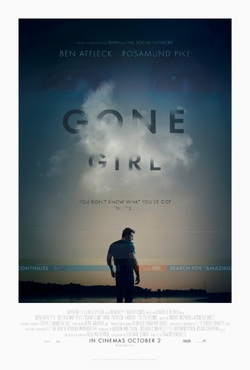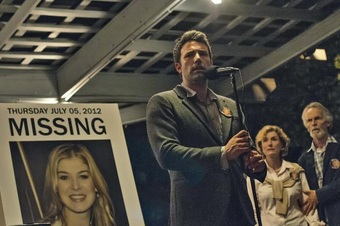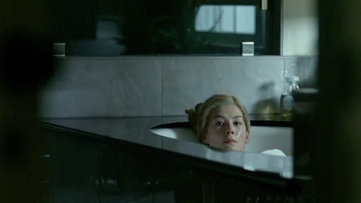
Sometimes as a film ends you can feel every member of the audience asking themselves; "what the hell just happened?"
This is usually a Michael Bay film issue where you question how such a pile of tosh ever managed to find funding. Luckily, at the other end of the shock spectrum, there is the Post David Fincher film reaction, often resonating after his new features.
The director who, in his thirty year career, has given us Fight Club, Seven and The Social Network brings us the hotly anticipated adaptation of Gillian Flynn's best-selling novel Gone Girl.

Gone Girl follows Fincher's current trend of adapting popular novels, shown recently in 2011's The Girl with the Dragon Tattoo and The Social Network. Here, author Flynn has adapted the novel for the screen which does deviate from its source material.
Despite changes, Fincher has faithfully followed the two half structure of the original work. We meet Nick in present time through his first person narrative and Amy in the past through flash back diary entries. Much of the tension on screen comes from the contrast of the two portrayals of Nick and Amy's marriage. As the plot progresses, both accounts begin to crumble. In the second half, Amy's fate is revealed and nets begin to close in on all the players.
Through both acts the film challenges the concept of innocent until proven guilty. As suspicion of Nick grows, he finds himself given almost celebrity status. His bar becomes a hot spot and he is even asked to pose for a selfie. Yet if Nick is placed on trial by the media, public and his neighbours then the film trials those who judge him. The police who assume he's guilty with no proof or the public and neighbours that demonize him through speculation and hearsay. For the first act, the audience tread a fine line between sympathising with an innocent man or following a killer. If the audience lean towards the latter, are they simple accepting the truth? Or are they part of the media scrum to get a juicy story? It is a strange position and part of what keeps the audience so hooked.

Ben Affleck is an actor that so many are on the fence about. With a lack of strong films and stand out performances under his belt, it is unusual he has reached the level he has. Yet here, Affleck throws everything he has at the role of Nick and gives us a layered and diverse portrayal of 'America's most hated man'. Affleck manages to succeed by playing to all the contrasting ideas of who his character might be; the innocent but awkward man who misses his wife as well as the remorseless killer.
Rosamund Pike does not have as many lead actress credits to her name as she is more often than not seen playing side roles. The jump to lead can be a bumpy one but it's safe to say this is a career best for her and quite an act to follow. For the first half of the film, Amy is shown through her own perspective in her diary entries; the beautiful, smart 'cool girl ' in a loving relationship that slowly begins to fall apart. Yet in Nicks account, Amy is anti-social, snobbish and manipulative. Pike nails the duality of the role brilliantly, able to convince as both the loving wife her diary recounts and the manipulative shrew that Nick suggests. The two-sided narrative works because, through the films leads, you can imagine both sides to be true.
Great support is given by Neil Patrick Harris, as well as Carrie Coon and Kim Dickens as the lead detective. Tyler Perry gives a lighter note to the film, without stunting it's dark tone, as the lawyer described as 'the patron saint to wife killers'. An impressive ensemble cast lead by its two knock-out leads.
A thrilling yet twisted tale adapted as only Fincher can. Featuring great performances, be prepared to be shocked and appalled in this frightening examination of marriage and media.
Gone Girl is out this Friday

 RSS Feed
RSS Feed
